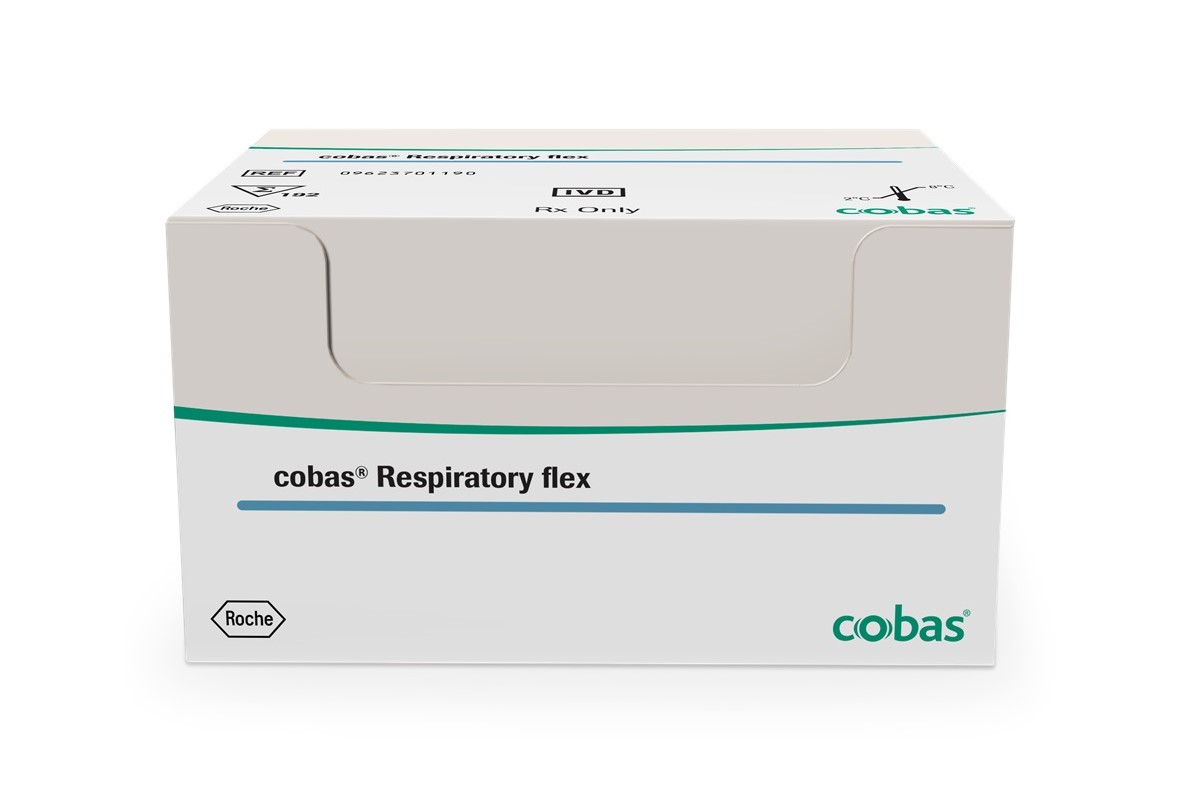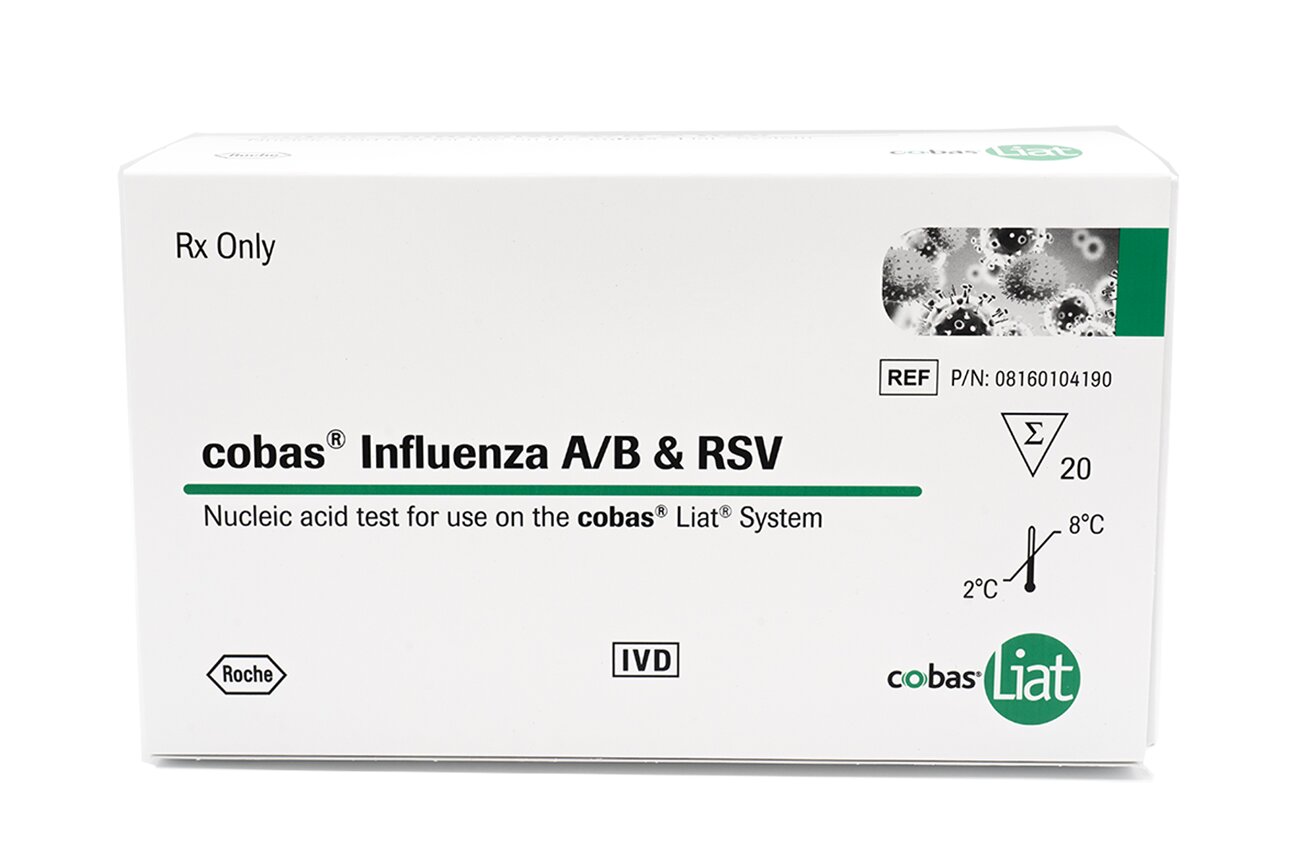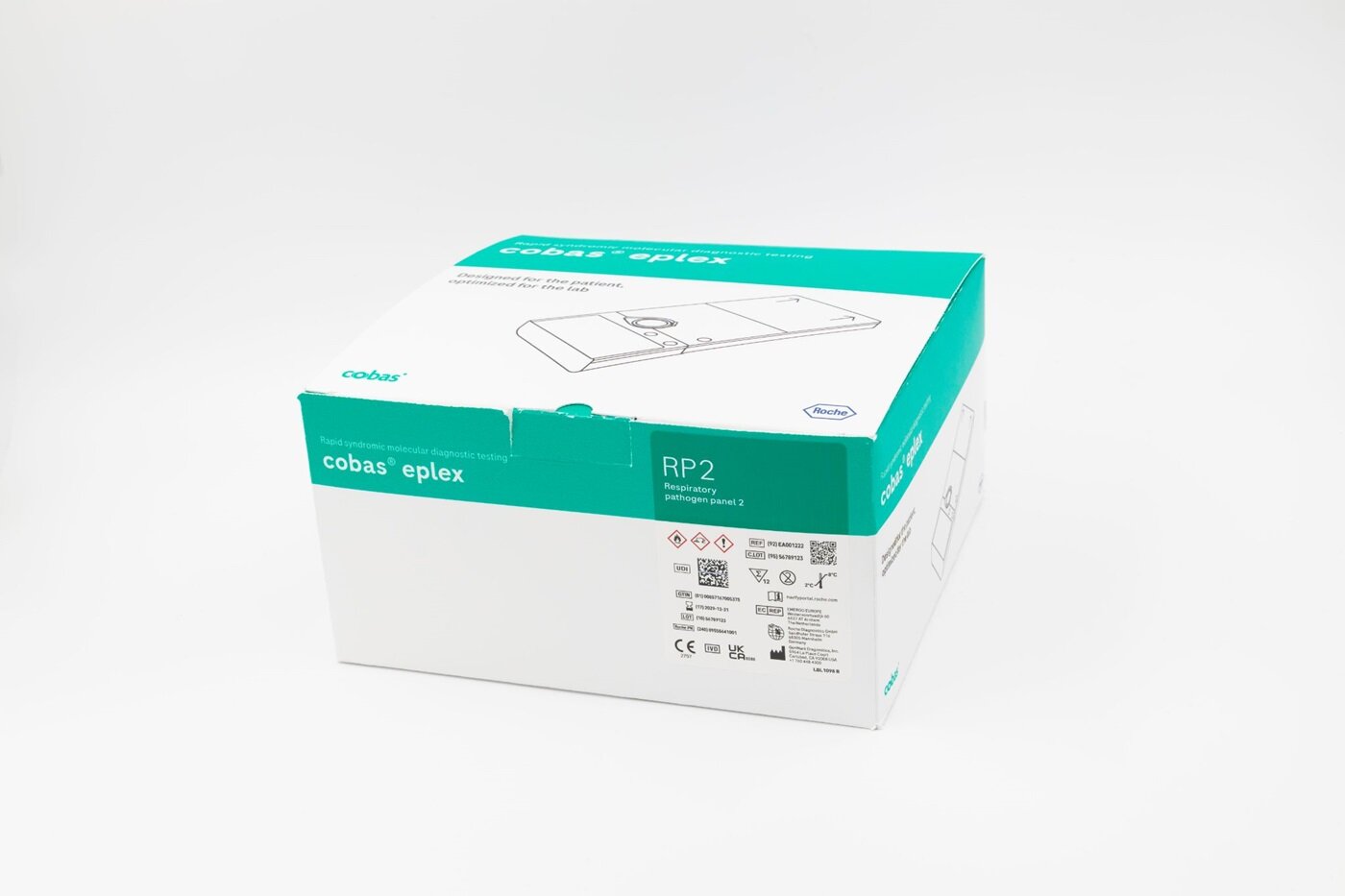For localized information and support, would you like to switch to your country-specific website for {0}?
Shining a light on respiratory tract infections
Committed to delivering impactful technologies that address real-world needs
Upper and lower respiratory tract infections present a global health challenge. Upper respiratory tract infections, such as the common cold are deemed less serious and often lead to fewer complications. However, lower respiratory tract infections can lead to pneumonia and bronchitis, and can often pose a substantial health threat. Those who tend to be most at risk are infants, the elderly, and the immunocompromised.1,2
At Roche, we know that identifying and differentiating respiratory pathogens is critical to effective infection management. With almost 30 years of experience in respiratory research, our diagnostic respiratory portfolio is based on the gold standard, PCR technology. Built on the foundations of quality and efficiency, our solutions are available across the continuum of care, offering a range of highly accurate tests to support the detection and management of respiratory disease. We work to support laboratories and testing centers around the world with innovative solutions that enable them to provide patients and their clinicians with a reliable diagnosis when, and where, it is needed most.
Behind every patient sample is a life. This is the driving force behind Roche’s relentless commitment to innovation.
Acute respiratory infections are one of the leading causes of death and disability in the world³
Respiratory infections were responsible for 11.3 million deaths worldwide in 2021,4 and are caused by a wide variety of pathogens. Viruses like influenza A and B, respiratory syncytial virus (RSV), and Severe Acute Respiratory Syndrome Coronavirus 2 (SARS-CoV-2) command much attention, but similar symptoms may also be presented by other pathogens, including viruses like enterovirus and rhinovirus and bacteria like Streptococcus and Mycobacterium tuberculosis (MTB, TB).
Influenza: Influenza is a seasonal respiratory illness that occurs annually, usually peaking in winter. It affects 5-10% of adults and 20-30% of children each year.5 Seasonal outbreaks can result in hospitalization and death mainly among high-risk groups (the very young, elderly, or chronically ill). Worldwide, annual epidemics are estimated to result in 3–5 million cases of severe illness and 290,000–650,000 deaths.6
RSV: RSV is an acute respiratory viral infection that is thought to infect almost all children before the age of two years and can result in severe disease and death. It is estimated that it accounts for 3.2 million hospital admissions, and up to 149,400 deaths annually.7 There is a disparity in the burden of disease between countries with 95% of infection episodes in young children occurring in low- and middle-income countries.8 RSV can also affect adults and is increasingly recognized as a cause of severe illness in adults over 60.9
SARS-CoV-2 (COVID-19): To date, COVID-19 has accounted for more than seven million deaths globally.10 Although no longer considered a global health emergency, the virus continues to circulate and change, with continued severe consequences for some such as hospitalization and death. The WHO reported a 42% increase in hospitalizations and a 62% increase in intensive care unit admissions in December 2023 compared with November 2023, and nearly 10,000 deaths from COVID-19 in the same period.11
Group A Streptococcus (GAS): GAS is carried in human throats or skin with infections peaking during the winter months and commonly affecting school-aged children. Illnesses are usually mild, such as tonsillitis, pharyngitis, and impetigo. However, in rare cases, GAS infection can lead to invasive GAS which causes life-threatening conditions such as necrotizing fasciitis and streptococcal toxic shock syndrome. GAS is responsible for more than 500,000 deaths globally each year.12
Tuberculosis: As the world’s deadliest infectious disease, in 2023 tuberculosis (TB) infected 10.8 million people, including 1.3 million children, and accounted for >1.25 million deaths. Caused by the bacillus Mycobacterium tuberculosis (MTB), TB co-infection with HIV and other pathogens further complicates diagnostic and treatment strategies for patients. While TB infects humans globally, the disease is prevalent in 30 high TB-burden countries which account for 87% of the TB infections worldwide.13
Barriers to early and accurate diagnosis
Identifying the underlying cause of a respiratory infection is essential to ensure appropriate treatment and effective use of resource. However, this can be challenging for a number of reasons.
Similar signs and symptoms
The non-specific clinical presentation of respiratory infections poses a considerable challenge to the differential diagnosis of pathogens. For example, influenza symptoms (including fever, headache, sore throat, muscle pains, body aches, runny nose, fatigue, and dry cough) overlap with many upper and lower respiratory infections caused by other bacterial and/or viral pathogens. This makes diagnosis based on symptoms alone challenging for clinicians.14
Overprescribing of antibiotics
In primary care settings, empiric treatment with antibiotics is frequently initiated—even when a viral infection is a strong possibility—leading to unnecessary or inappropriate prescribing of antibiotics.15 An early and accurate diagnosis is essential to identifying the cause of a respiratory infection and ensuring appropriate antimicrobial therapy. For example, the use of molecular Point of Care testing that can reliably detect viral and/or bacterial pathogens would result in enhanced care, less antibiotic empiricism, and reduced patient and societal costs of illness.
Complexity and sensitivity of testing
Bacterial culture was the traditional gold standard of diagnosis. However, there are drawbacks to this method as it can be labor-intensive, requires a high level of technical expertise, and has a long time to result.16 To optimize time-to-treatment, the diagnosis of acute respiratory tract infections cannot rely on the traditional method of culture alone. Therefore, other methods of detection have been developed to improve sensitivity, specificity, and detection time of pathogens causing respiratory tract infections.
Current diagnostic methods commonly used are point-of-care rapid antigen tests, molecular Point of Care tests and lab-based polymerase chain reaction (PCR) tests.17,18 Clinicians must consider which test is most appropriate as although PCR tests are highly sensitive, the turnaround time for results is longer than an antigen test. On the other hand, antigen tests are generally less sensitive and have the potential to show false negatives.
Accuracy in testing is important as false negative results may pose a serious medical risk for patients and could lead to further spread of the virus to others. On the other hand, false positive results may lead people to believe they have been exposed to the virus and have developed antibodies, when in fact they have not.
Underdiagnosis
During the past 20 years in the US, only a small percentage of those presenting with influenza-like illness were tested and, of those tested, only 23% to 43% during peak activity were associated with a positive test for influenza.19 Therefore, while testing has a clear role to play in the accurate diagnosis of respiratory illness, it is not always utilized. Reasons for this discrepancy can be related to funding, access to appropriate tests, and even perception of the dangers of respiratory viruses.19
Underdiagnosis poses a major challenge to the World Health Organization (WHO)’s goal of eliminating TB by 2030. In 2023, only 63% of people who were newly diagnosed with pulmonary TB were biologically confirmed with a molecular test. This translates to 3 million TB patients who did not receive a molecular test to confirm diagnosis.20 To reach these TB-elimination goals, healthcare agencies, national governments, and other stakeholders have emphasized the need for innovative diagnostics so clinicians can receive the information they need to properly diagnose infections, improve treatment access and reduce disease transmission.
Featured products
Benefits of Roche diagnostic solutions for managing respiratory tract infections
Helping to transform what's possible with respiratory testing21,22
A trusted partner now and in the future: Over the past three decades, Roche has consistently developed highly sensitive and specific molecular and serologic tests which are considered the gold standard for detecting the presence of viral pathogens. As the developer of the world's first commercial PCR test to detect SARS-CoV-2, Roche regularly monitors for changing or emerging viral pathogens and continues to deliver tests for detecting them.
Solutions and services that you can count on: The Roche solution includes tests, diagnostic platforms, connectivity solutions, and consulting and implementation support for introducing testing into any clinical or laboratory setting - bringing care closer to the patient. Roche PCR Respiratory Solutions can assist experts with accurate diagnosis to enable appropriate treatment potentially easing the burden on healthcare professionals and helping to reduce winter pressures.
High-quality tests across the continuum of care: We are committed to enhancing care for all settings and situation. Roche’s Respiratory solutions consist of a variety of platforms and focused and multiplex respiratory assays. We offer point of care PCR testing, comprehensive and fast respiratory panel testing and flexible and efficient centralized PCR testing. Our latest addition to our multiplex menu is the cobas® Respiratory flex assay. Flexible and efficient, it can support testing up to 12 respiratory viruses, but puts control in the hands of the lab. Our easy-to-operate solutions are proven to be effective in the community, clinics and hospitals, delivering precision diagnoses for high-risk patients as well as centralized lab settings.
Roche total respiratory solutions: Transforming what’s possible in respiratory testing
Roche has developed a comprehensive range of rapid respiratory tests, technologies and assays for primary, secondary, and community care settings. We are helping customers to transform what’s possible with respiratory testing.
Empowering primary care with rapid respiratory testing
The primary care setting plays a critical role in the diagnosis and management of respiratory infections, with respiratory symptoms being the most common reason for primary care consultations.23
Roche ’s cobas® liat platform offers targeted and near-patient multi- and single-target assays with results in minutes. Quick respiratory testing enables clinicians to provide appropriate advice, guidance, and treatment at the right time and place. Moving respiratory testing to local clinics and the community could also reduce pressure on primary and secondary care providers
Roche cobas® liat system delivers gold-standard PCR testing at the point of care:21,22
- Rapid frontline multiplex testing covering common respiratory targets
- Easy to use with less than 1 minute of hands-on time and intuitive easy-to-use interface
- Clinically actionable results for flu A/B and SARS-CoV-2 are available in 20 minutes
- Small design made to fit any clinic, urgent care, or satellite location
Delivering confidence in complex respiratory diagnoses
In complex cases, clinicians need diagnostic confidence for the most appropriate treatment and prescribing.
Roche offers comprehensive coverage that can identify infections beyond influenza, SARS-CoV-2, and RSV and even identify co-infections. Results can be used to guide isolation recommendations to prevent the spread of infection to other patients.
Roche cobas® eplex provides comprehensive, fast syndromic testing of 20+ respiratory targets for high-risk patients21,22
- Easy-to-use workflow with less than 1 minute of hands-on time
- Urgent, actionable results for high-risk patients
- Random and continuous access to perform testing on all shifts
- Modular and scalable
Streamlining respiratory testing to support overburdened teams
Easing the burden on under-pressure physicians and laboratory staff is particularly important during a winter surge. Multiplex testing enables under-pressure lab staff to focus on priority cases.
Roche offers flexible, high-throughput, syndromic testing that can be customized. Clinicians can order respiratory tests that are optimized for settings and address seasonality, local dynamics, and patient cohorts.
Roche cobas® Respiratory flex for use on cobas® 5800/6800/8800 systems delivers gold-standard PCR technology offering focused and first-of-its-kind flexible and reliable respiratory testing21,22
- Multiplex testing in hospitals for 12 most common viral respiratory pathogens
- Pre-calibrated ready-to-use reagents and automation require minimal technician interaction
- Highest throughput and the longest walk-away time available among automated molecular platforms

The Roche respiratory testing continuum
Outlining possibilities to enhance care across all pathways with Roche respiratory solutions
*Dependent on assays available in your local market.
References
- Das S, Dunbar S, Tang YW. Laboratory Diagnosis of Respiratory Tract Infections in Children - the State of the Art. Front Microbiol. 2018;9:2478.
- Echavarría M, Marconea DN, Querci M, et al. Clinical impact of rapid molecular detection of respiratory pathogens in patients with acute respiratory infection. J Clin Virol. 2018;108:90-95.
- World Health Organization. Global Health Estimates: Life expectancy and leading causes of death and disability [Internet: cited 2024 Nov 7]. Available from: https://www.who.int/data/gho/data/themes/mortality-and-global-health-estimates
- World Health Organization. The top 10 causes of death [Factsheet: cited 2024 Nov 7]. Available from: https://www.who.int/news-room/fact-sheets/detail/the-top-10-causes-of-death
- World Health Organization. Influenza [Internet: cited 2024 Nov 7]. Available from: https://www.who.int/teams/health-product-policy-and-standards/standards-and-specifications/norms-and-standards/vaccine-standardization/influenza
- World Health Organization. Influenza (Seasonal) [Factsheet: cited 2024 Nov 7]. Available from: https://www.who.intnews-room/fact-sheets/detail/influenza-(seasonal)
- Pebody R et al. Approaches to use the WHO respiratory syncytial virus surveillance platform to estimate disease burden. Influenza Other Respir Viruses. 2019 Oct 8;14(6):615-621.
- Munro APS et al. The disease burden of respiratory syncytial virus in Infants. Curr Opin Infect Dis. 2023 Aug 23;36(5):379–384.
- Michelin L et al. Respiratory syncytial virus: challenges in diagnosis and impact on the elderly: Recommendations from a multidisciplinary panel. Hum Vaccin Immunother. 2024 Aug 19;20(1):2388943.
- World Health Organization. COVID-19 dashboard [Internet: cited 2024 Nov 7]. Available from: https://data.who.int/dashboards/covid19/deaths?n=o
- World Health Organization. WHO press conference on global health issues [Internet: cited 2024 Nov 7]. Available from: https://www.who.int/multi-media/details/who-press-conference-on-global-health-issues-10-january-2024
- World Health Organization. Increased incidence of scarlet fever and invasive Group A Streptococcus infection - multi-country [Internet: cited 2024 Nov 7]. Available from: https://www.who.int/emergencies/disease-outbreak-news/item/2022-DON429#:~:text=Epidemiology,hygiene%20can%20help%20control%20transmission.
- World Health Organization. Tuberculosis [Factsheet: cited 2024 Nov 7]. Available from: https://www.who.int/news-room/fact-sheets/detail/tuberculosis
- Uyeki TM et al. Influenza. Lancet. 2022;400:693–706.
- Sijbom M et al. Determinants of inappropriate antibiotic prescription in primary care in developed countries with general practitioners as gatekeepers: a systematic review and construction of a framework. BMJ Open. 2023 May 17;13(5):e065006.
- Calderaro A et al. Respiratory Tract Infections and Laboratory Diagnostic Methods: A Review with A Focus on Syndromic Panel-Based Assays. Microorganisms. 2022;10(9): 1856.
- Centers for Disease Control and Prevention. Rapid Influenza Diagnostic Tests [Internet: cited 2024 Nov 7]. Available from: https://www.cdc.gov/flu/hcp/testing-methods/clinician_guidance_ridt.html?CDC_AAref_Val=https://www.cdc.gov/flu/professionals/diagnosis/clinician_guidance_ridt.htm
- Centers for Disease Control and Prevention. Information on Rapid Molecular Assays, RT-PCR, and other Molecular Assays for Diagnosis of Influenza Virus Infection [Internet: cited 2024 Nov 7]. Available from: https://www.cdc.gov/flu/hcp/testing-methods/molecular-assays.html?CDC_AAref_Val=https://www.cdc.gov/flu/professionals/diagnosis/molecular-assays.htm
- Spencer JA et al. Distinguishing viruses responsible for influenza-like illness. J Theor Biol 2022 July 21; 545:111145.
- World Health Organization. Global Tuberculosis Report 2024, 2.2. Diagnostic testing [Internet: cited 2024 Nov 7]. Available from: https://www.who.int/teams/global-tuberculosis-programme/tb-reports/global-tuberculosis-report-2024/tb-diagnosis-and-treatment/2-2-diagnostic-testing
- Hoffmann-La Roche Ltd. Data on file.
- Hoffmann-La Roche Ltd. Data on file.
- Abdel-Aal A et al. Prioritising primary care respiratory research needs: results from the 2020 International Primary Care Respiratory Group (IPCRG) global e-Delphi exercise. NPJ Prim Care Respir Med. 2022 Jan 28;32:6.



